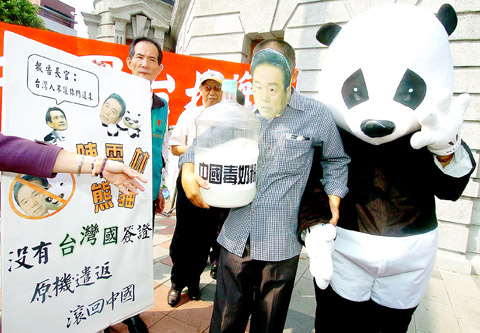Chinese authorities said yesterday that tests had found traces in nearly 12 percent of milk powder products of an industrial chemical that has so far sickened 53,000 children, killing four.
As China marked its national day, Chinese President Hu Jintao (胡錦濤) said lessons must be learned from the scandal over tainted milk that has soiled China’s reputation and led to a series of bans or curbs on its dairy exports worldwide.
The Anglo-Dutch company Unilever became the latest big-name brand to recall some Chinese products, taking Lipton milk tea powder off shelves in Hong Kong and Macau after tests showed they contained traces of melamine.

PHOTO: LIU HSIN-DE, TAIPEI TIMES
“Food safety is directly linked to the well-being of the broad masses and the competence of a company,” Hu said during a tour on Tuesday of dairy companies in Anhui Province, Xinhua news agency reported.
“Chinese companies should learn from the lessons of the Sanlu tainted milk powder incident,” he said, referring to Sanlu Group whose toxic baby formula was at the origin of the crisis.
A sweeping nationwide check has found melamine in 31 milk powder products, representing 11.7 percent of a total of 265 products put to the test, said the General Administration of Quality Supervision, Inspection and Quarantine. They came from 20 different companies, including Sanlu Group and several of its partner enterprises.
All had been produced before Sept. 14, it said, insisting products made after that date were safe.
The agency said it had checked 154 companies altogether, representing more than 70 percent of the entire market for milk powder.
In Shijiazhuang, where Sanlu is headquartered, authorities issued an unusual apology for their tardy response to the scandal, the China Daily reported.
Wang Jianguo, a spokesman for the Shijiazhuang leadership, said the city felt “a deep sense of guilt and regret” over the sick children.
He said the government received reports from Sanlu Group on Aug. 2 that some milk powder caused kidney stones, but waited until Sept. 9 to pass on the report to the Hebei provincial government.
Instead of alerting their superiors, Shijiazhuang officials offered medical treatment to patients, urged Sanlu to import inspection machines and recalled the company’s milk powder, the paper said.
Sanlu also asked for government help in “managing” the media response to the scandal, the People’s Daily reported, citing Wang.
He said Sanlu asked the local government to monitor milk quality and take legal action against people adding melamine.
It also asked the government “to strengthen management, control and coordination of the media ... to create a favorable environment for the company’s recall of problem products and prevent a negative impact on society by stirring up the issue,” the newspaper said.
Wang said officials had not considered the consequences of their actions.
“We mistakenly thought that taking necessary measures and raising product quality could mitigate the effect and reduce losses,” he said.
“The bungling of the best opportunity to report up the handling of the issue caused much harm to people’s safety, and seriously affected the image of the party and the government,” Wang said.
Meanwhile, the parents of an infant thought sickened by the tainted baby formula have launched what could be the first lawsuit of the scandal against Sanlu, said Ji Cheng, an attorney in Beijing.

SECURITY: As China is ‘reshaping’ Hong Kong’s population, Taiwan must raise the eligibility threshold for applications from Hong Kongers, Chiu Chui-cheng said When Hong Kong and Macau citizens apply for residency in Taiwan, it would be under a new category that includes a “national security observation period,” Mainland Affairs Council (MAC) Minister Chiu Chui-cheng (邱垂正) said yesterday. President William Lai (賴清德) on March 13 announced 17 strategies to counter China’s aggression toward Taiwan, including incorporating national security considerations into the review process for residency applications from Hong Kong and Macau citizens. The situation in Hong Kong is constantly changing, Chiu said to media yesterday on the sidelines of the Taipei Technology Run hosted by the Taipei Neihu Technology Park Development Association. With

CARROT AND STICK: While unrelenting in its military threats, China attracted nearly 40,000 Taiwanese to over 400 business events last year Nearly 40,000 Taiwanese last year joined industry events in China, such as conferences and trade fairs, supported by the Chinese government, a study showed yesterday, as Beijing ramps up a charm offensive toward Taipei alongside military pressure. China has long taken a carrot-and-stick approach to Taiwan, threatening it with the prospect of military action while reaching out to those it believes are amenable to Beijing’s point of view. Taiwanese security officials are wary of what they see as Beijing’s influence campaigns to sway public opinion after Taipei and Beijing gradually resumed travel links halted by the COVID-19 pandemic, but the scale of

A US Marine Corps regiment equipped with Naval Strike Missiles (NSM) is set to participate in the upcoming Balikatan 25 exercise in the Luzon Strait, marking the system’s first-ever deployment in the Philippines. US and Philippine officials have separately confirmed that the Navy Marine Expeditionary Ship Interdiction System (NMESIS) — the mobile launch platform for the Naval Strike Missile — would take part in the joint exercise. The missiles are being deployed to “a strategic first island chain chokepoint” in the waters between Taiwan proper and the Philippines, US-based Naval News reported. “The Luzon Strait and Bashi Channel represent a critical access

Pope Francis is be laid to rest on Saturday after lying in state for three days in St Peter’s Basilica, where the faithful are expected to flock to pay their respects to history’s first Latin American pontiff. The cardinals met yesterday in the Vatican’s synod hall to chart the next steps before a conclave begins to choose Francis’ successor, as condolences poured in from around the world. According to current norms, the conclave must begin between May 5 and 10. The cardinals set the funeral for Saturday at 10am in St Peter’s Square, to be celebrated by the dean of the College